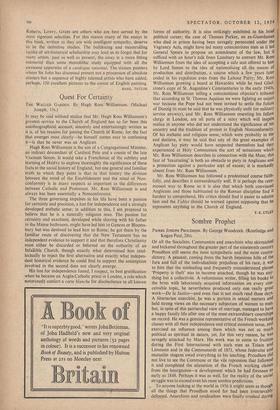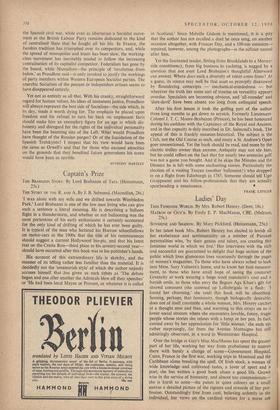Sombre Prophet
OF all the Socialists, Communists and anarchists who skirmished and bickered throughout the greater part of the nineteenth century Proudhon still seems the most sympathetic and the most contra• dictory. A peasant, coming from the harsh limestone hills of the Jura and full of the individualistic prejudices of his race, it Was to him that the misleading and frequently misunderstood phrase 'Property is theft' was to become attached, though he was any thing but a collectivist. A voluminous writer, filling his books to the brim with laboriously acquired information on every con• ceivable topic, he nevertheless produced only one really great work—De la Justice—and even that is not much read these daYs, A libertarian anarchist, he was a puritan in sexual matters and held strong views on the necessary subjection of women to men, but, in spite of this patriarchal view of marriage, managed to have a happy family life after one of the most extraordinary courtships on record. He was a genuine representative of the French working classes with all their independence and critical common sense, and exercised an influence among them which was not so much political as spiritual in nature, yet, for this very reason, he was savagely attacked by Marx. His work was to come to fruition during the First International with such men as Tolain and Limousin and in the Communards of 1871, whose federalist and mutualist slogans owed everything to his teaching. Proudhon did not live to see the Commune or the vile repression that followed it and completed the alienation of the French working classes from the bourgeoisie—a development which he had foreseen as early as 1848. Perhaps it was as well, for the reality of the social struggle was to exceed even his most sombre predictions,
. To anyone looking at the world in 1956 it might seem as though all the things that Proudhon stood for had been irretrievably defeated. Anarchism and syndicalism were finally crushed during
the Spanish civil war, while even as libertarian a Socialist move- ment as the British Labour Party remains dedicated to the kind of centralised State that he fought all his life. In France, the Jacobin tradition has triumphed over its competitors, and, while the spread of monopolies and trusts has been slow, the working- class movement has inevitably tended to follow the increasing centralisation of its capitalist competitor. Federalism has gone by the board, while Mutualism—the principle of 'revolution from below,' as Proudhon said—is only invoked to justify the workings of party members within Western European Socialist parties. The anarchic Socialism of the peasant or independent artisan seems to have disappeared entirely.
Yet not as entirely as all that. With his cranky, straightforward regard for human values, his ideas of immanent justice, Proudhon will always represent the best side of Socialism—the side which, in its day, made it worth dying for. The emphasis he placed upon freedom and his refusal to turn his back on unpleasant facts should make him an exemplary figure for an age in which dis- honesty and disregard for the rights of the individual personality have been the besetting sins of the Left. What would Proudhon have thought of the Russian purges? Or of the liquidation of the Spanish Trotskyists? I suspect that his view would have been the same as Orwell's and that for those who excused atrocities on the grounds that they benefited future generations his scorn would have peen as terrible.
ANTHONY HARTLEY











































 Previous page
Previous page